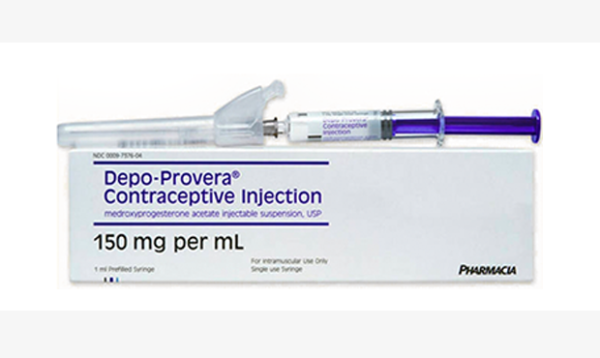Product Description

ABOUT DEPO PROVERA:
The birth control shot is an injection of a hormone that prevents pregnancy. Each shot prevents pregnancy for three months.
The shot is also known by the brand name Depo-Provera, or by the name of the medicine in the shot, DMPA.
How it works:
Like other methods of birth control, the shot releases a hormone — progestin — into the body.
The progestin in the shot works by:
• Keeping eggs from leaving the ovaries. Pregnancy cannot happen if there is no egg to join the sperm.
• Making cervical mucus thicker. This keeps sperm from getting to the eggs.
If you get the birth control shot within the first seven days after the start of your period, you are protected from pregnancy immediately. If you get the shot within five days after miscarriage or an abortion, or within three weeks after giving birth, you are protected from pregnancy immediately. Otherwise, you need to use some form of backup birth control for the first week after getting the shot. Each shot of Depo-Provera will protect you from pregnancy for 12 weeks. So you will need to go to your health care provider every 12 weeks for a shot.
Effectiveness of product:
The birth control shot is one of the most effective methods of birth control available. It works best when you get the birth control shot regularly every 12 weeks.
Less than 1 out of 100 women will get pregnant each year if they always use the birth control shot as directed.
About 6 out of 100 women will get pregnant each year if they don’t always use the birth control shot as directed.
Keep in mind the birth control shot doesn’t protect against sexually transmitted infections. Use a latex or female condoms reduces the risk of infection.
• Do not require daily action.
• Are private: No one else can tell that a woman is using.
• Injections can be stopped at any time.
• Are good for spacing births.
Following side effects have been reported:
• Missed periods: Can be due to stress or illness. If a period is missed or is very light while on the pill, a pregnancy test is recommended prior to taking the next pack of pills; if further periods are missed or are very light, seek medical advice
• Weight gain: Weight gain may also be related to a reduction in physical activity or increased intake of food. In some women the androgenic effects from the progestin in their OCs can increase their appetite.
• Headaches: If headaches are experienced when taking the pills should seek medical attention.
• Dizziness: It is likely to experience random dizziness. It’s recommended to take a lot of water. If it persist seek for medical attention.
• Breast tenderness: Tends to improve a few weeks after starting the pill, but anyone who finds a lump in the breast or who has persistent pain/tenderness or severe breast pain should seek medical help.
1. Do monthly injectables cause birth defects? Will the foetus be harmed if I accidentally use monthly injectables while I am pregnant?
No. It doesn’t cause birth defects and will not otherwise harm the foetus if a woman becomes pregnant while using monthly injectables or accidentally starts injectables when she is already pregnant.
2. Do monthly injectables cause abortion?
No. Research on combined contraceptives finds that they do not disrupt an existing pregnancy. They should not be used to try to cause an abortion. They will not work not matter what.
3. Do monthly injectables make a woman infertile?
No. There may be a delay in regaining fertility after stopping monthly injectables, although fertility decreases as women gets older.
4. How long does it take to become pregnant after stopping monthly injectables?
Women who stop using monthly injectable should wait a month to become pregnant compared to women using other methods. This means they become pregnant on average 5 months after their last injection. If she has not become pregnant even as much as 12 months after stopping the use, seek medical advice.
5. What if a woman returns for her next injection late?
It is recommended giving a woman her next monthly injection if she is up to 7 days late, without the need for further evidence that she is not pregnant. If later than 2 weeks, make sure the woman has done a pregnancy test before giving next injection. Also advise on getting next injection on time.

